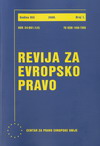EU FINANCIAL ASSISTANCE TO CANDIDATE AND POTENTIAL CANDIDATE COUNTRIES IN THE BALKANS
EU FINANCIAL ASSISTANCE TO CANDIDATE AND POTENTIAL CANDIDATE COUNTRIES IN THE BALKANS
Author(s): Gordana IlićSubject(s): Politics / Political Sciences, Politics, Law, Constitution, Jurisprudence, EU-Approach / EU-Accession / EU-Development
Published by: Удружење за европско право - Центар за право Европске уније
Keywords: EU; CARDS; financial assistance; conditions; perspectives; local ownership
Summary/Abstract: The study is dealing with the analysis of the EU financial assistance to candidate and potential candidate countries through CARDS programme, being recent EU financial instrument, which established single legal framework for the EU assistance. Lessons learnt from previous EU aid programs indicate that the sustainability is ensured only when the technical aid closely involves partner country administration. Local ownership is crucial in defining priorities of the assistance. Compliance of political preconditions, set by EU, is necessary for achieving the status of eligible country for EU financial aid. One of main political preconditions for Balkan countries is fostering regional cooperation. EU considers effective regional cooperation in South-Eastern Europe as complementary way i.e. the road in the direction of closer links of these countries with the EU. In addition to regional cooperation and good-neighborly relations, conditions for EU financial aid include also credible commitments to democratic reform with obligations on facilitating refugee return for each country in the region. Furthermore economic reforms are necessary supplement to the EU financial assistance. If not accompanied by economic reforms in candidate countries, EU financial support would not be sustainable. Implementation of the EU financial aid in the Balkan countries is being analyzed through reviewing of situation in each of concerned countries. Post 2004 perspectives point out that the risk of further instability and border violations, with possible "spill-over" effects in the region and wider is a matter of deep concern to the EU. At the same time, it is also one of main incentives for the EU financial assistance to the region. However, bearing in mind the forthcoming EU enlargement in 2004 the future EU assistance to the Balkan region is faced with the specific crisis of post-2004 prospects. EU reconstruction aid is not enough for the post 2004 perspectives in the Balkan region. EU policy of declining aid after turning off the fire of war conflicts in the region could prove to be dangerous seen from the standpoint of achieving sustainable stability and long-term prosperity in the Balkans. EU can be and should be a centrifugal force for the Balkan region.
Journal: Revija za evropsko pravo
- Issue Year: 4/2002
- Issue No: 2-3
- Page Range: 5-38
- Page Count: 34
- Language: English

